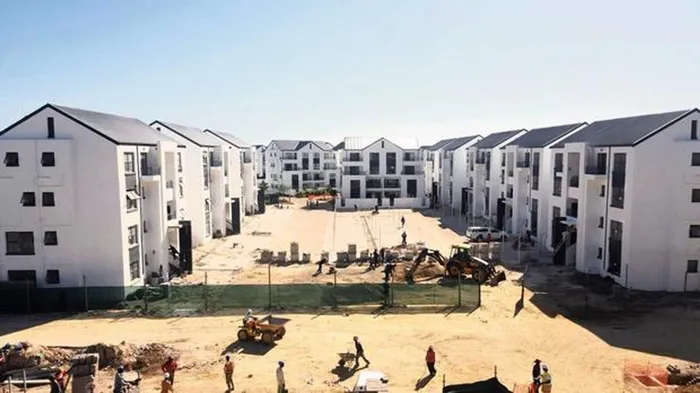Balwin management in spotlight after head office news goes viral

INVESTORS in Balwin Properties, a developer of mid-to-upper income apartments, are questioning whether the company’s management has made the right decision to buy property to house its new head office. Picture: Supplied
BALWIN Properties’ shares sank 5 percent in intraday trade yesterday as its controversial purchase of a new head office in upmarket Melrose Arch, Johannesburg, took a new twist on social media as Piet Viljoen, a portfolio manager at Counterpoint Asset Management, declared it a bad move.
Balwin’s shares trade were down 5.33 percent at R3.02 at 2pm, while the FTSE/JSE Real Estate index was up 0.26 percent at 1 050.44 points.
“I would estimate the return on investment for the type of property Balwin management just bought with shareholders' funds will be less than 5 percent annually,” Viljoen said on twitter.
Viljoen’s twitter comment yesterday came after BR attempts to get comment from him on the weekend were unsuccessful.
Balwin last week announced it was buying Erf 108 Birnam, measuring 2999 square meters in extent for R125 802942 - a purchase market participants on social media see as lavish and flashy.
This despite Balwin motivating the move, saying that, among other benefits, the acquisition would reduce its utility costs, was well logistically positioned, would provide it with a better facility for staff, and be good for advertising.
Attempts to contact Balwin Property yesterday for comment were unsuccessful by the time of going to print.
Viljoen yesterday on twitter @pietviljoen laid out his argument.
“Balwin has just bought a head office building for over R100m, eliciting lots of comments on fintwit. Given that one of the key tasks of any management team is capital allocation, what does this action tell us about Balwin's management?” he said.
To answer this, Viljoen said one needed to examine what management's options were for deploying such a substantial amount of capital. The first and best investment option for management is generally to invest to expand the business. This could take the form of additional working capital, or even additional equipment and/or staff. However, this only makes sense if the business could earn a return on investment above its cost of capital.
“Balwin has been unable to do so for several years now. In their last reporting period, they earned a return of 8 percent on capital. So from this point of view management was wise not to invest in further expansion,” he said.
Viljoen said the second option was to invest in the existing business, by buying back their own shares on the open market. Balwin’s shares trade at less than half of net asset value. By investing at this price, they could earn a satisfactory return of more than 16 percent.
“However, management has chosen not to take this action. In fact, they recently issued new shares at an even lower price, thereby diluting already poor returns on capital even further. And now, they have bought a new head office,” he said in a thread on Twitter.
Viljoen noted the returns on investing in property were notoriously poor, saying that property generally yielded less than 10 percent, and that was before one had set aside money to maintain the property in good condition, which was expensive.
Estimates ran at 2-3 percent of the value of the property, annually, plus the frictional costs of buying and selling, which could be significant , and if any taxes were paid on income and capital gains (if any).
“So, of the three available investment options, management chose the worst one. Investors can only come to one of two conclusions: Either management does not understand capital allocation, or they value owning a head office more than generating a good return for shareholders. Whichever of these is true, there is only one option for investors. Avoid investing in the company,” he said.
Viljoen’s view differs from independent analyst Ryk de Klerk, who said on Friday that the move to buy a head office made sense.
De Klerk said in October 2020, the Mooikloof Mega Residential City in Tshwane, Gauteng, was launched. It was a public-private partnership between Balwin Properties, the provincial government, and the City of Tshwane. It was a huge project where residential property developments would eventuate to some 50 000 sectional title units.
It was, therefore, understandable that Balwin needed additional office space, De Klerk said.
BUSINESS REPORT
Related Topics: